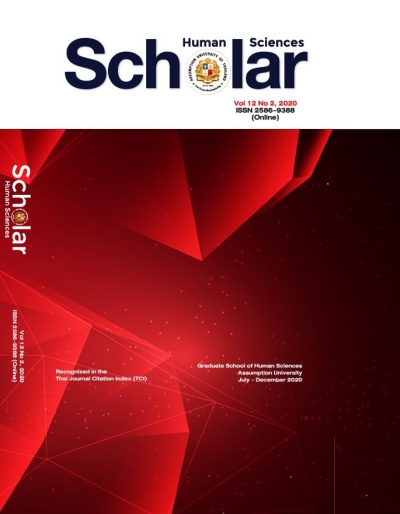The Relationship of Parents’ and Teachers’ Perceptions of Students’ Social-Emotional Development with Their Chinese Language Learning Achievement in Nursery 2 at a Trilingual International School in Bangkok
Keywords:
Social-Emotional Development, Parents’ Perception, Teachers’ Perception, Chinese language Learning Achievement, Early Childhood Education, Trilingual International SchoolAbstract
The purpose of this research were to examine the level of parents’ and teachers’ perceptions of students’ social-emotional development, and the relationship of the students’ social-emotional development with their Chinese language learning achievement of Nursery 2 (N2) at a trilingual international school in Bangkok. In this research, 81 parents and 28 teachers of 81 N2 students enrolled in the 2017-2018 school year in this school participated. This research followed a quantitative research methodology employing the questionnaires of parents’ and teachers’ perceptions of students’ social-emotional development, and the N2 Term 3 Chinese language summative assessment of the 2017-2018 school year to determine the level of students’ Chinese language learning achievement. There were four main elements included in this research: the level of parents’ and teachers’ perceptions of students’ social-emotional development, the level of Chinese language learning achievement, and the relationship between students’ social-emotional development and their Chinese language learning achievement. In this research, the students’ social-emotional development focused on three areas: paying attention-following direction, self-regulation, communication and interaction. Chinese language learning achievement focused on listening, speaking, communicating, also reading and tracing Chinese characters. There were four main findings: 1) the parents’ perception of students’ social-emotional development was on schedule; 2) the teachers’ perception of students’ social-emotional development was on schedule; 3) the students’ Chinese language learning achievement was exceeding the expectation; 4) there was a significant relationship of the parents’ and teachers’ perceptions of the students’ social-emotional development with their Chinese language learning achievement in N2 level at a trilingual international school in Bangkok.
References
Bandura, A., & Walters, R. H. (1977). Social learning theory. Englewood Cliffs, NJ: Prentice-Hall.
Bodrova, E., & Leong, D. J. (2006). Self-regulation as a key to school readiness: How early childhood teachers can promote this critical competency. In M. Zaslow & I. Martinez-Beck (Eds.), Critical issues in early childhood professional development (pp. 203-224). Baltimore, MD: Brookes.
Caprara, G. V., Barbaranelli, C., Pastorelli, C., Bandura, A., & Zimbardo, P. (2000). Prosocial foundations of children’s academic achievement. Psychological Science, 11, 302–306. doi:10.1111/14679280.00260
CASEL. (2013). Effective social and emotional learning programs. Retrieved from https://casel.org/wp-content/uploads/2016/01/2013-casel-guide-1.pdf
Cicchetti, D. E., & Cohen, D. J. (1995). Developmental psychopathology, Vol. 1: Theory and methods. New York, NY: John Wiley & Sons.
Denham, S. A. (1998). Emotional development in young children. New York, NY: Guilford Press.
Denham, S. A., & Holt, R. W. (1993). Preschoolers' likability as cause or consequence of their social behavior. Developmental Psychology, 29(2), 271-275.
Erikson, E. (1963). Children and society. New York, NY: Norton.
Essa, E. L. (1996). Introduction to early childhood education. Boston, MA: Cengage Learning.
Fantuzzo, J., Perry, M. A., & McDermott, P. (2004). Preschool approaches to learning and their relationship to other relevant classroom competencies for low-income children. School Psychology Quarterly, 19, 212–230. doi:10.1521/scpq.19.3.212.40276
Ladd, G. W., Birch, S. H., & Buhs, E. S. (1999). Children’s social and scholastic lives in kindergarten: Related spheres of influence? Child Development, 70, 1373–1400. doi: 10.1111/ 14678624.00101
Martin, R. P., Drew, K. D., Gaddis, L. R., & Moseley, M. (1988). Prediction of elementary school achievement from preschool temperament: Three studies. School Psychology Review, 17, 125-137.
Maslow, A. H. (1970). Motivation and personality (2nd ed.). New York: Harper & Row.
Saville-Troike, M. (1982). Communicative tactics in children's second language acquisition. Canada: McGill University.
Sholtys, K. C. (1989). A new language, a new life. Young Children, 44(3), 76-77.
Squires, J., & Bricker, D. (2009). An activity-based approach to developing young children's social-emotional competence. Baltimore, MD: Paul H Brookes Publishing.
Squires, J., Bricker, D., & Twombly, E. (2002). Ages & stages questionnaires: Social-emotional. Baltimore, MD: Paul H. Brookes Publishing Company.
Thornton, L., & Brunton, P. (2015). Understanding the reggio approach: Early year’s education in practice. Abingdon, UK: Routledge.
Velikonja, T., Edbrooke‐Childs, J., Calderon, A., Sleed, M., Brown, A., & Deighton, J. (2017). The psychometric properties of the Ages & Stages Questionnaires for ages 2‐2.5: A systematic review. Child: Care, Health and Development, 43(1), 1-17.
Vygotsky, L. (1978). Interaction between learning and development. Readings on the Development of Children, 23(3), 34-41.
Wentzel, K. R. (1999). Social influences on school adjustment: Commentary. Educational Psychologist, 34(1), 59–69. doi:10.1207/s15326985ep3401_5
Zins, J. E., Bloodworth, M. R., Weissberg, R. P., & Walberg, H. J. (2007). The scientific base linking social and emotional learning to school success. Journal of Educational and Psychological Consultation,




